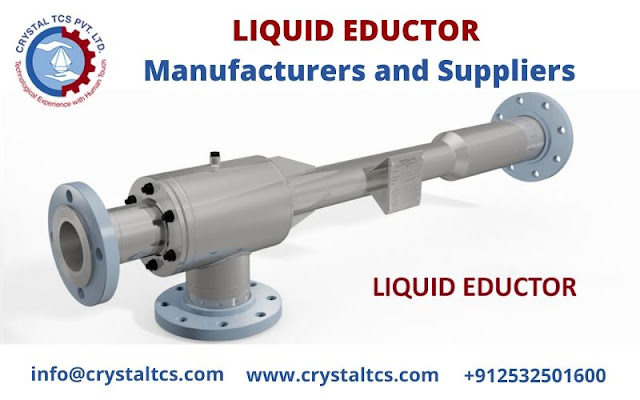Water is constantly injected inside the slurry cone to provide instantaneous hydration, reduce dust, and avoid clumps. The high-velocity jet of liquid from the eductor nozzle creates a vacuum, which causes the suction of the mixed liquid. Sodimate solutions are an ideal way to continuously produce solutions or well blended slurries and are commonly used in chemical, food, power, pharmaceutical, and wastewater applications.
The Liquid Eductor enables to lift, entrain and pump out a low pressure liquid utilizing a high pressure motive liquid. The high pressure motive liquid enters the motive chamber of the eductor through a converging motive nozzle. At the eductor nozzle, the pressure energy of the motive liquid is converted into a high velocity jet. The momentum present in the motive liquid is transferred to the suction liquid thereby enabling a LIFT, entrainment & mixing. Thus the high velocity motive liquid mixes with the suction liquid and the combined streams then enters the venturi throat and diffuser section where the mixing continues. Velocity energy is converted to a pressure intermediate to the suction and motive pressure.
 |
| Liquid Eductor |
Liquid Eductors, or jet pumps, use water or other liquids to create vacuum that can be used to suck in other liquids for mixing, diluting or creating solutions. Liquid Jet Gas Ejectors are used to lift, pump, mix, and agitate liquids, granular solids, and slurries. They are sometimes called aspirators, Venturi pumps, or jet pump ejectors. Because eductors are non-mechanical, they do not include moving parts or require lubrication. Because they do not require electricity, eductors can be used in hazardous environments.
Outstanding Features of Liquid Eductor
Low Cost - Units are small in relation to the work they do and the cost is correspondingly low.
They work similarly well in constant or discontinuous help.
No Moving Parts - Eductors are exceedingly basic and solid. There are no moving parts to wear or break in a basic eductor. When furnished with extras, for example, controlling shafts, snap valves, glide components, they require little consideration, just intermittent review, and support.
Corrosion and Erosion Resistant - Because they can be made of practically any workable material, or coated with corrosion-resistant materials, Liquid Eductors can be made highly resistant to the actions of the liquids handled or the environment in which they are located.
Safe - Educators can be used in hazardous locations where electrically operated alternates would require explosion proofing at considerable cost.
Versatile - Different piping arrangements of action grant adjusting to natural conditions. Eductors of different sorts can deal with granular solids, semi-solids, and slurries without defilement.
Automatically Controlled - Units can be adjusted for automatic control by methods for a weight fluid controlling shaft or a snap-valve and float arrangement.
Easy to Install - Connections can be made to suit your channeling prerequisites. Little space is required to suit units and they are regularly so light in weight they can be bolstered by the funneling to which they are joined.
Liquid Eductor / Jet Pump eliminates the use of a slurry mixing tank, reduces the electrical consumption and floor footprint. The resulting slurry can be transferred horizontally and vertically with a few pounds of pressure at the process end injection point.
Crystal TCS Pvt. Ltd has committed itself to strive continuously for technological excellence and puts a great emphasis on delivering quality products and Liquid Eductor services.
Crystal TCS Pvt. Ltd
Contact us: +912532501600
Comments
Post a Comment